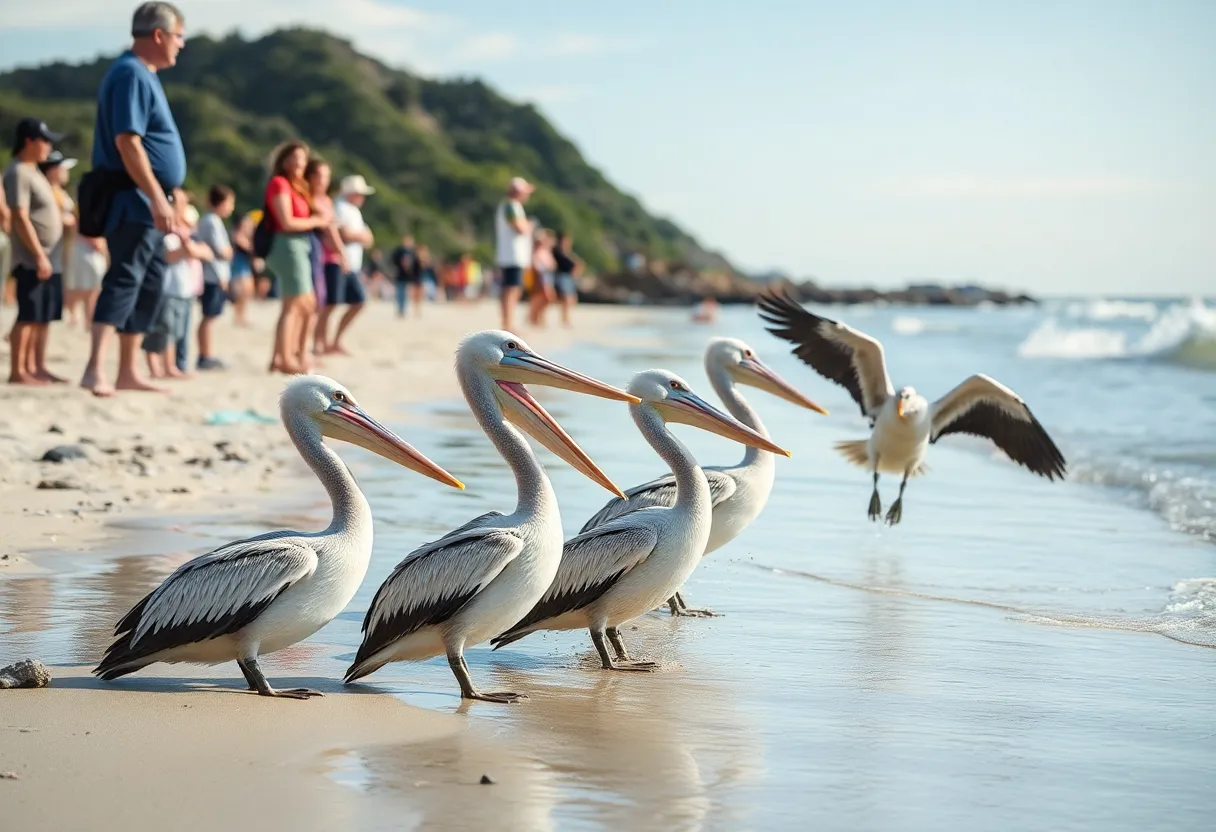News Summary
Twelve brown pelicans, having recovered from severe domoic acid poisoning, were released at Huntington Beach. This event underscores a significant health crisis impacting local marine wildlife, primarily due to a harmful algal bloom. The Wetlands and Wildlife Care Center is seeking support amidst a record number of cases, with concerns rising over the impact on younger bird populations. With critical rehabilitation efforts ongoing, the situation highlights the need for community involvement to safeguard the local ecosystem.
Huntington Beach – Twelve brown pelicans that recovered from severe domoic acid poisoning were released at Huntington Beach on Wednesday morning, an event marked by a gathering of spectators eager to witness the birds take flight. The release occurred around 10 a.m. at Tower 3 on the beach, symbolizing a hopeful outcome in the face of a concerning health crisis affecting local marine wildlife.
The pelicans were among the victims of a major outbreak of domoic acid toxicity, considered one of the worst on record by wildlife rehabilitation experts. This year’s outbreak has notably compromised the health of various marine species, including sea lions and other seabirds. The alarming increase in cases poses significant threats to local ecosystems and wildlife populations.
Domoic acid is a neurotoxin produced by certain types of algae, which accumulate in fish. Marine birds, such as pelicans, that consume these fish can experience severe neurological impairments. Symptoms of this poisoning range from seizures and paralysis to abnormal behavior, making it a critical issue for affected bird populations.
The treatment process for the pelicans at the Wetlands and Wildlife Care Center involved addressing several health issues caused by the toxin. The twelve pelicans that were successfully released had undergone treatment for seizures, dehydration, and malnutrition. Of the thirteen pelicans treated, one remains at the center for continued recovery, highlighting the challenges faced by wildlife rehabilitators in managing such cases.
The Wetlands and Wildlife Care Center is currently facing an unprecedented strain, with over 650 animals, including more than 50 sick pelicans, in their care as a result of the domoic acid outbreak. Recent figures reveal that the center has received at least 125 pelicans just within the past month, many presenting in critically poor condition. The center’s staff has been stretched thin, leading to concerns about burnout due to long hours and increasing workloads.
Executive Director Debbie McGuire noted that the center has not encountered this volume of domoic acid toxicity cases in nearly two decades, prompting a need for additional support and resources to sustain their operation. Treatment protocols at the center include providing IV fluids, conducting blood tests, and administering anti-seizure medications. Unfortunately, not all of the affected birds survive despite receiving comprehensive medical care.
The center has recently observed a troubling trend, with younger birds becoming more affected by domoic acid toxicity. Traditionally, adult pelicans were primarily the patients treated for this condition. The shift suggests a potential loss of adult birds needed for nurturing younger ones, indicating an alarming cycle of decline in the local seabird population. The center is in the process of verifying whether younger birds are being impacted by the same toxin.
To combat the escalating crisis, the Wetlands and Wildlife Care Center is actively seeking volunteers willing to help on a weekly basis. Additionally, they are accepting donations of essential supplies, such as towels and mealworms, which are vital for the care of the birds. Financial contributions are especially critical as the center’s annual operating expenses total approximately $1 million, enabling them to continue providing essential rehabilitation services to affected wildlife.
The impact of domoic acid toxicity has been profound, with local wildlife officials warning that many seabirds are unable to feed independently due to severe health complications. Furthermore, there has been a noticeable spike in cases of sick sea lions and other marine creatures, including two whales recently found washed ashore, although the connection to the ongoing domoic acid outbreak is yet to be determined.
The current situation underscores the urgent need for continued vigilance and intervention to prevent further declines in marine bird and wildlife populations along the coast.
Deeper Dive: News & Info About This Topic
HERE Resources
WWCC Faces Crisis as Wildlife Distress Peaks Amid Toxic Algae Bloom
Additional Resources
- Audacy: 12 Pelicans Released at Huntington Beach
- Wikipedia: Domoic Acid
- LAist: Sick Brown Pelicans Flood Huntington Beach Wildlife Facility
- Google Search: Domoic Acid Toxicity
- CBS News: Sickened Brown Pelicans Overwhelming Orange County Animal Care Center
- Google Scholar: Brown Pelicans
- KTLA: Orange County Wildlife Center Needs Help Amid Surge of Ailing Pelicans
- Encyclopedia Britannica: Brown Pelicans
- The Inertia: Brown Pelicans Killing California
- Google News: Marine Wildlife Health Crisis

Author: STAFF HERE COSTA MESA WRITER
The COSTA MESA STAFF WRITER represents the experienced team at HERECostaMesa.com, your go-to source for actionable local news and information in Costa Mesa, Orange County, and beyond. Specializing in "news you can use," we cover essential topics like product reviews for personal and business needs, local business directories, politics, real estate trends, neighborhood insights, and state news affecting the area—with deep expertise drawn from years of dedicated reporting and strong community input, including local press releases and business updates. We deliver top reporting on high-value events such as the OC Fair, Concerts in the Park, and Fish Fry. Our coverage extends to key organizations like the Costa Mesa Chamber of Commerce and Boys & Girls Clubs of Central Orange Coast, plus leading businesses in retail, fashion, and technology that power the local economy such as Vans, Experian, and South Coast Plaza. As part of the broader HERE network, including HEREAnaheim.com, HEREBeverlyHills.com, HERECoronado.com, HEREHollywood.com, HEREHuntingtonBeach.com, HERELongBeach.com, HERELosAngeles.com, HEREMissionViejo.com, HERESanDiego.com, and HERESantaAna.com, we provide comprehensive, credible insights into California's dynamic landscape.


